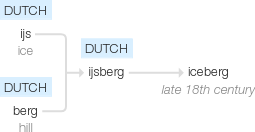Iceberg
late 18th century: from Dutch ijsberg, from ijs ‘ice’ + berg ‘hill’.
wiktionary
Borrowed from Dutch ijsberg (compound of ijs(“ice”) + berg(“mountain”)), from Middle Dutch ijsberch. First used to describe a glacier as seen at a distance from a ship then used as a term to describe the floating chunks of ice broken off from such glaciers. Cognate to German Eisberg, Danish isbjerg, Norwegian isberg and Swedish isberg.
etymonline
iceberg (n.)
1774, "glacier humped like a hill;" 1820 as "detached piece of a glacier or ice pack at sea," partial loan-translation of Dutch ijsberg, literally "ice mountain," from ijs "ice" (see ice (n.)) + berg "mountain" (from PIE root *bhergh- (2) "high," with derivatives referring to hills and hill-forts.). Similar formation in Norwegian isberg, Danish isbjerg.
Earlier English terms were sea-hill (1690s), island of ice (1610s). Phrase tip of the iceberg in a figurative sense (in allusion to most of it being unseen underwater) first recorded 1962. Iceberg lettuce attested from 1893, apparently originally a trade name.
